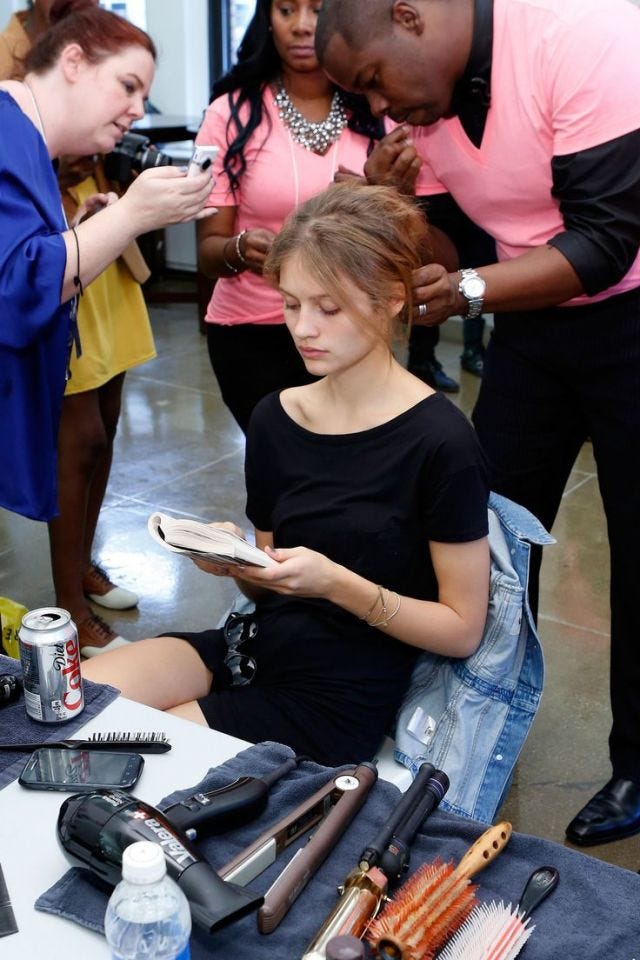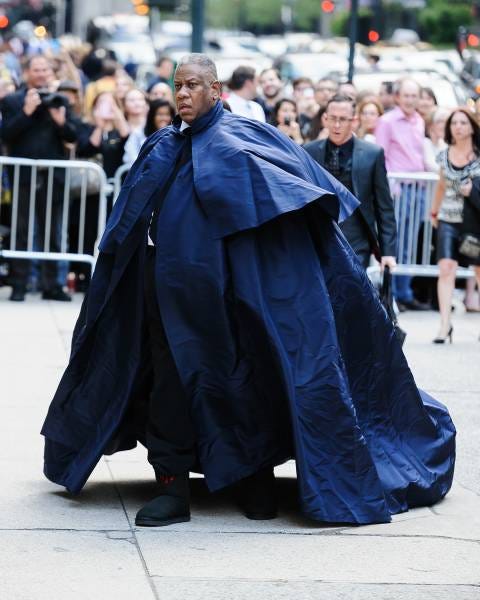So What, Who Cares (vol 3, issue 28) Who's in the mood for a glad-rags reading list?
Hello!

I have gotten a few requests for reading lists/compilations of clothing-related books I've recommended in the past. I thought in lieu of a news analysis today -- which, let us be frank, will be everywhere on other news anyway -- I'd finally list some of the books I've mentioned and others I think are worth reading, all on the topic of how clothing ties into society.
Some of these are more theory-driven, others are basically biographies of people who work in and around fashion. All of them will advance your understanding of how strongly clothing is linked to our senses of self and society.
*
The Language of Clothes, Alison Lurie
Why you should read it: Lurie brings some literary analysis to what shapes and colors mean in people's dress, and since the book is several decades old, it helps explain class-based attitudes toward some items of clothing, and how certain colors may have shifted in cultural context from the 1980s on.
The Meaning of Sunglasses: And a Guide to Almost All Things Fashionable, Hadley Freeman
Why you should read it: Because it's a delightful Aughties look at the social signaling that brands and clothing items send. Freeman's tone is as fizzy and tart as a good lemon-champagne cocktail and her section on the meaning of Karl Lagerfeld is both keen and hilarious.
A Dedicated Follower of Fashion, Holly Brubach
Why you should read it: Brubach's meditations on elegance and the decline thereof, juxtaposed against her repeated meditations on how aesthetics changed in the 1990s, are a great shot of retro-style analysis for anyone who is like, "How did grunge actually change fashion?"
The End of Fashion, Teri Agins
Why you should read it: Proving that business reporting can be a form of future-telling, Agins was on to the world-shaking implications of fast fashion and shifting consumer behavior before e-commerce broke big and really got things going.
Hijacking the Runway: How Celebrities Are Stealing the Spotlight from Fashion Designers, Teri Agins
Why you should read it: Again, good reporting explaining the shifting undercurrents of society and how they change how we look. Agins' target here: How fashion houses have forgotten that not all customers are white -- but celebrities have not.
The Battle of Versailles: The Night American Fashion Stumbled into the Spotlight and Made History, Robin Givham
Why you should read it: A painstakingly reported and lyrically written account of a single event which highlighted the falling-away of fashion's old cultural and aesthetic norms and the rise of a more diverse and easygoing moment. Like a lot of other books about fashion during the 1970s, knowing how AIDS is about to decimate this entire industry lends this read a very poignant tenor.
The Fashionable Mind: Reflections on Fashion, 1970-1982, Kennedy Fraser
Why you should read it: A series of lovely, critical essays on how clothing reflected societal shifts in attitudes, starting just before women could actually get their own independent credit in the U.S. and ending right as AIDS was beginning to breach mainstream consciousness.
The Beautiful Fall: Fashion, Genius, and Glorious Excess in 1970s Paris, Alicia Drake
Why you should read it: See the prior two reads. This is a snapshot of a very specific period and it manages to convey how very, very different everyday assumptions about culture were -- and how that shaped dress. Also -- young Karl Lagerfeld! It is to die.
Champagne Supernovas: Kate Moss, Marc Jacobs, Alexander McQueen, and the '90s Renegades Who Remade Fashion, Maureen Callahan
Why you should read it: A natural bookend to Drake's book, capturing what it's like to be on the other side of the AIDS epidemic and using/losing muses when you have talent to spare.
Model Woman: Eileen Ford and the Business of Beauty, Robert Lacey
Why you should read it: Because gatekeepers are a huge factor in the business of why we want to look a certain way, and this book amply illustrates how Ford defined generations of commercial attractiveness.
Fashion Victim: Our Love-Hate Relationship with Dressing, Shopping, and the Cost of Style, Michele Lee
Why you should read it: It's an early look at the woes besetting the rag trade in the 21st century, from lousy materials to terrible working conditions, with a lightly critical examination of how divorced consumers are from the means of production.
Overdressed: The Shockingly High Cost of Cheap Fashion, Elizabeth L. Cline
Why you should read it: This is a natural follow-up on Fashion Victim, with another decade's examination of how disposable clothing made by underpaid workers is thoroughly woven into consumers' conceptions of how we should dress.
Subculture: The Meaning of Style, Dick Hebdige
Why you should read it: It's a nicely thinky book about how subcultures use aesthetics to declare and reflect their values -- and it was written in 1979, so it helps lay an intellectual base for understanding how cleverly fashion media and retailers commodify dissent and alienation. (So now you can read circa-1990s Commodify Your Dissent and nod knowingly.)
Fashion, Desire and Anxiety: Image and Morality in the Twentieth Century, Rebecca Arnold
Why you should read it: This is basically an undergrad course on how fashion amplifies, confirms or redefines power structures in a society, in every aspect from gender roles to class to wealth.
Fashion and Its Social Agendas: Class, Gender, and Identity in Clothing, Diana Crane
Why you should read it: If you're into historical analyses of class, gender and capitalism, go for it! This is a fairly dry read but so well-sourced, you could use it if you ever had to write a paper for a college course.
Fear and Clothing: Unbuckling American Style, Cintra Wilson
Why you should read it: Imagine your funniest, sharpest, most emotionally labile friend trying to understand 2010s-era America by how its constituents dress. It's purely observational, and vital reading right now.
The Substance of Style: How the Rise of Aesthetic Value Is Remaking Commerce, Culture, and Consciousness, Virginia Postrel
Why you should read it: This is the primer on Americans' increasing aesthetic sophistication. It was released right as "masstige" hit mainstream retail and buoyed sales for a decade and explains it all.
Deluxe: How Luxury Lost Its Luster, Dana Thomas
Why you should read it: Speaking of masstige, here's Thomas explaining how brands carefully aimed their shiny products at aspiring consumer classes -- and how that's working out for them.
The Lost Art of Dress: The Women Who Once Made America Stylish, Linda Przybyszewski
Why you should read it: It's a look at the effort everyday women put into getting dressed and the army of skilled professionals who encouraged them to express their thrift, creativity and aesthetic sensitivity through their wardrobe.
Cheap Chic: Hundreds of Money-Saving Hints to Create Your Own Great Look, Carol Troy and Caterine Milinaire
Why you should read it: Because oh my God, does Przybyszewski hate this book and that alone makes this a fun read in the imp-of-the-perverse way. But the real reason to read this is to get an idea of a sort of boho, improvisational style moment from the liberated 1970s; it would be hard not to believe this book isn't part of former Lucky style editor Andrea Linnett's style DNA.
Speaking of editors and style media, I wrote up some reads here but I'll repeat and expand upon them now.

A.L.T.: A Memoir, Andre Leon Talley
Why you should read it: Because it is bonkers in a great way. This is a dude who spends a lot of time swathed in designer silk caftans and yet writes with great sincerity and persuasion about the luxury and dignity of doing your own laundry. He got his start by becoming Diana Vreeland's assistant, which leads to ...
Empress of Fashion: A Life of Diana Vreeland, Amanda Mackenzie Stuart
Why you should read it: It is just what you want in a biography: Plenty of facts, a soupcon of dishy gossip, and a well-sourced framing device to explain why this person mattered and what their legacy is.
D.V.: Diana Vreeland, Diana Vreeland
Why you should read it: Patton Oswalt once described Robert Evans' The Kid Stays In the Picture thusly: "It's like listening to Lucifer dictate his memoirs on a Sunday afternoon -- you know, lying on his couch in a bathrobe, with a martini on his belly ..." This book -- D.V. -- is the distaff equivalent. That's a compliment.
Grace: A Memoir, Grace Coddington
Why you should read it: It is is as much about a time and place in fashion history as it is about Coddington herself. Her description of British Vogue in the early 1980s could double as any scene in Absolutely Fabulous where Patsy had to go to the office (as a British Vogue editor, natch).
I Want to Be Her!: How Friends and Strangers Helped Shape My Style, Andrea Linnett
Why you should read it: A style editor at not one but two cult-favorite lady magazines (Sassy and Lucky), Linnett wrote a memoir via her outfits, where she captures the giddy excitement of trying on different identities.
Free Gift with Purchase: My Improbable Career in Magazines and Makeup, Jean Godfrey-June
Why you should read it: It has a very end-of-an-era feel to it, as Godfrey-June was in the last tier of women who could make a plushy career in print media aimed at mass markets. She drops chill personal-philosophy tidbits like "Marriage is a crapshoot" in between dishy gossip about 1990s-era Elle magazine.
Tales from the Back Row: An Outsider’s View from Inside the Fashion Industry, Amy Odell
Why you should read it: Because Odell is the first of the memoirs from the next generation of fashion and women's media editors. Odell's approach to work and to fashion is comparatively transparent and she assumes her audience is very media-savvy.
The Price of Illusion: A Memoir, Joan Juliet Buck
Why you should read it: Part of the fun is digging into Buck's motivations in rewriting the record on her Vogue Paris editorship and her career-killing profile of Asma al-Assad, which ran riiiiiiiight as the Arab Spring dawned. It is a book that spans three decades of life as a Beautiful Person, however, and it's striking to see how she shrugs off the ravages of the 1980s compared to her contemporaries.
*

